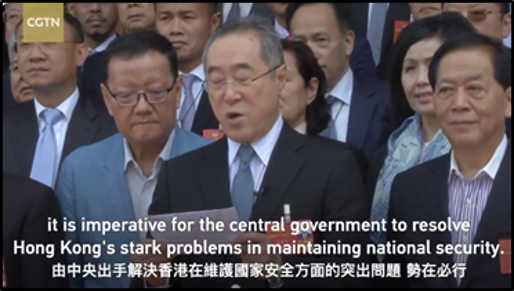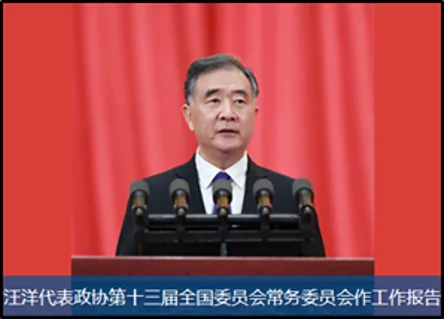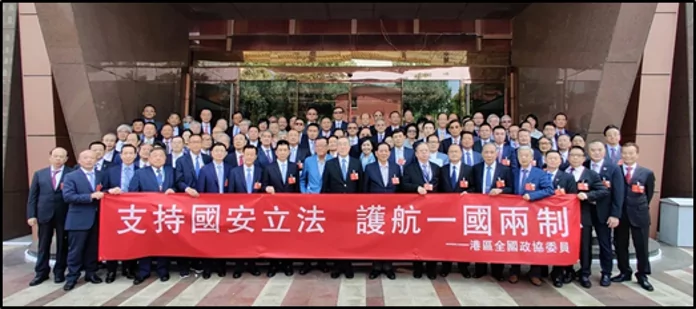
Themes from the CPPCC Signal the End of Hong Kong Autonomy—and the Effective End of the “One Country, Two Systems” Framework
Publication: China Brief Volume: 20 Issue: 10
By:

Introduction
The annual meetings of the National People’s Congress (NPC) and the Chinese People’s Political Consultative Conference (CPPCC), known collectively as the “Two Sessions” (两会, Liang Hui), are the biggest official events on the annual political calendar of the People’s Republic of China (PRC). Usually convened concurrently in early March of each year, this year’s meetings were deferred to the latter half of May due to the COVID-19 pandemic crisis. This year’s meeting of the NPC, China’s official legislative body, was most noteworthy for passing a new “national security” law intended to facilitate Beijing’s tighter control over Hong Kong (see discussion by Dr. Willy Lam separately in this issue).
The Chinese People’s Political Consultative Conference (中国人民政治协商会议, Zhongguo Renmin Zhengzhi Xieshang Huiyi) functions, per official narratives, as an advisory body for the government—to include providing representation for persons and social groups outside of the ruling Chinese Communist Party (CCP). In reality, the CPPCC is controlled and carefully stage-managed by the CCP United Front Work Department (Zhongyang Tongzhan Bu, 中央统战部), or UFWD, and its institutional architecture (existing at both the national and provincial levels) serves three primary functions: first, to provide a veneer of pluralism to the CCP party-state apparatus; second, as a tool for the cooptation of social and business elites in the pursuit of CCP policy goals; and third, as a forum for delegates to parrot prioritized CCP propaganda themes.
In this year’s session (the third annual meeting of the 13th CPPCC appointed in 2018) held in Beijing from May 21-27, all of these functions were on display. Although CPPCC meetings promote multiple propaganda themes, some stand out more than others: for example, the 2019 session gave particular prominence to the need for the further “Sinicization” of religion, which serves as coded language for bringing religious practice under tighter state control (China Brief, April 9, 2019). This year’s session featured a prominent role for Hong Kong delegates to the CPPCC—who are cultivated and selected by the CCP’s united front apparatus—speaking up in support of Beijing’s new national security legislation directed at the Hong Kong Special Administrative Region (HKSAR).
In tandem with the developments emerging from the NPC, the messages from this year’s CPPCC signal the central government’s intent to dramatically tighten the reins on Hong Kong—as well as to further erode any meaningful provisions for regional autonomy within Beijing’s long-touted “One Country, Two Systems” (一国两制, Yi Guo Liang Zhi) framework.

Wang Yang’s Work Report to the CPPCC
Wang Yang (汪洋) is the member of the CCP Politburo Standing Committee with responsibility for the united front policy portfolio—and as a component of this, serves concurrently as the Chairman of the CPPCC Standing Committee. Wang delivered the committee’s official work report to the CPPCC during its opening session on May 21. In the past, the CPPCC has often been used as a forum to reiterate the CCP’s “One Country, Two Systems” (OCTS) formula, as in Wang’s 2019 work report statement that “We will implement the One Country, Two Systems principle comprehensively and accurately—under which the people of Hong Kong govern Hong Kong, the people of Macau govern Macau, and both regions enjoy a high degree of autonomy” (SCMP, May 21).
Wang’s report this year omitted any reference to autonomy, asserting instead the need to “strengthen the [sense of] political responsibility and mission readiness for Hong Kong and Macao committee members”—with the term “political responsibility” (政治责任, zhengzhi ziren) reflecting commonly-used coded language for loyalty to the CCP. The only direct mention of the OCTS framework was of the need to “propagandize about the successful practice of ‘One Country, Two Systems’ in Macau” (People’s Daily, May 22), with that territory apparently held up as a success story for assimilation into the PRC—in contrast to its far more restive cousin Hong Kong.
Wang Yang’s work report made only passing mention of Taiwan, asserting the need to continue “cross-Strait grassroots administration exchanges and communication” and to “deepen exchanges and contacts with relevant political party groups, social organizations, and persons from various walks of life on Taiwan Island” (People’s Daily, May 22)—an apparent call for continued united front engagement, while ignoring Taiwan’s government. This brief treatment was all the more striking in light of the fact that Taiwan President Tsai Ing-Wen (蔡英文) had been inaugurated for a second term the previous day, delivering a speech that forcefully asserted Taiwan’s sovereignty and intent to pursue a greater international role—as well as explicitly rejecting Beijing’s “One Country, Two Systems” framework for cross-Strait relations (Focus Taiwan, May 20; CNA, May 21).
HKSAR Delegates and Their Role in CCP Propaganda
On May 22, the HKSAR delegates to the CPPCC—all groomed and selected by the CCP’s united front system—gathered for a photo op to show support for the new legislation unveiled at the NPC. The spokesman for the group was Henry Tang Ying-yen (唐英年), Chief Secretary of the HKSAR from 2007 to 2011, and a member of the CPPCC Standing Committee. As a current director with the Bank of East Asia (BEA Profile, undated), Tang well embodies the nexus of political and business interests commonly found among the social elites recruited by the CCP’s united front system. Reading a prepared statement in support of the NPC legislation for “safeguarding national security,” Tang stated that:
We, members of the National Committee [of the CPPCC] from the Hong Kong region, express our firm support for the bill… Since the return [to China], there have been clear legal loopholes for [the HKSAR] in the aspect of maintaining national security… the Hong Kong opposition, in collusion with external forces, has wreaked havoc; Hong Kong radical forces have become increasingly widespread; and violent terrorist activities have steadily escalated. Serious damage has been done to Hong Kong’s rule of law and the people’s livelihoods, [thereby] threatening national sovereignty, security, and development interests. Without national security, there cannot be prosperity and stability in Hong Kong… it is imperative that the Center take action to solve Hong Kong’s outstanding problems in maintaining national security (CGTN Twitter, May 23).
Tang offered assurances that law-abiding citizens of the HKSAR had no cause for concern, as the law would impact only those advocating separatism, terrorism, and collusion with foreign powers. However, such assurances are likely to do little to ease concerns in Hong Kong—particularly in light of some of the language in Tang’s statement. Although some English-language sources translated the statement as saying that the “central government” needed to intervene, Tang’s statement actually referred to “the Center” (中央, zhongyang), which is common PRC media parlance for the top CCP leadership around Xi Jinping. The statement also made explicit mention of the crime of “subverting state power” (颠覆政权, dianfu zhengquan), a vague catch-all offense commonly leveled against dissidents in the PRC (CGTN Twitter, May 23; Renmin Zhengxie Bao, May 23).

The choreographed display by the Hong Kong CPPCC delegates has been cited by PRC state media as evidence of broad support in Hong Kong for the national security legislation (China Daily, May 23; CGTN Twitter, May 23). This illustrates a time-honored united front tactic: first, carefully select and cultivate the persons intended to pose as the representatives of a given place or group; and then have these persons perform as the stage-managed mouthpieces for CCP propaganda talking points. It is intended to give the impression of grassroots political representation, while serving in reality as a mechanism for top-down control.
Conclusion
In April, the PRC central government signaled its intent to tighten control over the HKSAR via “national security” measures (China Brief, May 1). Beijing now appears to be making good on these threats. The themes from this month’s CPPCC, taken together with similar themes and actions on display at the NPC, bode ill for the HKSAR’s fragile state of semi-autonomy. The senior CCP leadership, exasperated about (and likely frightened by) the 2019 unrest in the territory, has evidently decided that cracking down on Hong Kong’s opposition movement will be worth the price to be paid in terms of international opprobrium.
These moves also reveal the bankruptcy of Beijing’s long-standing framework for dealing with the Chinese-speaking territories on its periphery over which it claims sovereignty. The leadership cohort under Xi Jinping invoked the OCTS formula ever-more insistently throughout 2019: to call both for the closer integration of Hong Kong with the PRC, as well as for concrete steps towards unification with Taiwan, all to be conducted on Beijing’s terms (China Brief, February 15, 2019; China Brief, August 14, 2019; China Brief, November 1, 2019). However, the top CCP leadership echelon—apparently blind as to how their own efforts to subvert HKSAR autonomy produced the widespread unrest seen in the territory in 2019, as well as to how those moves have further alienated sentiment in Taiwan—may itself be losing patience with the increasingly hollow slogan of “One Country, Two Systems.”
John Dotson is the editor of China Brief. For any comments, queries, or submissions, feel free to reach out to him at: cbeditor@jamestown.org.



